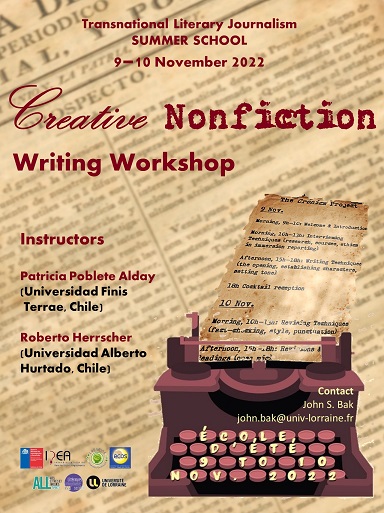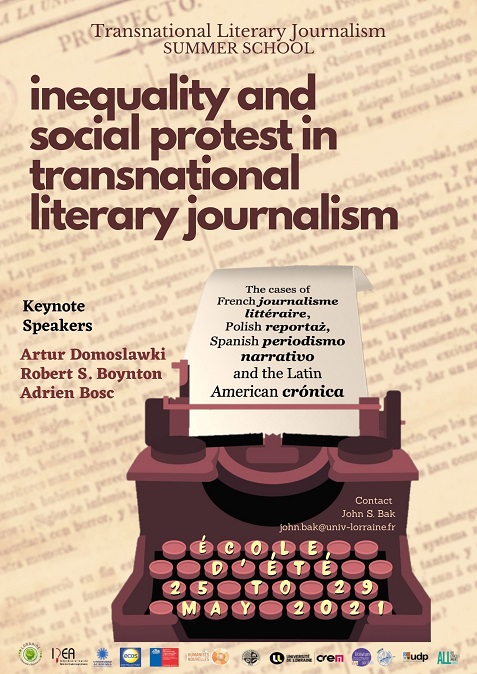
|
|
|
|
home NEW!
Creative Nonfiction Writing Workshop
9 - 10 November 2022
Université de Lorraine, Nancy (France)
 For more information, click on "Course Program"
or contact John S. Bak
Transnational Literary Journalism Summer School
“Inequality and Social Protest in Transatlantic Literary Journalism: The Cases of French journalisme littéraire, Polish reportaż Spanish periodismo narrativo and the Latin American crónica” 25–29 May 2021 Université de Lorraine (Nancy) 
Literary journalism – or journalism as literature – is journalistic writing that reads like fiction but which is based entirely on immersive research, eyewitness accounts and verifiable facts as closely scrutinized as possible. Situated comfortably between two axes of media pedagogy and research, literary journalism (journalisme littéraire in French, periodismo literario in Spanish, reportaż in Polish and crónica in Latin America) represents a form of written communication that is both literary and journalistic in form and aesthetic but which informs and educates the public, provides detailed historical and cultural contexts and editorial commentaries and, potentially, alters socio-political policy and opinion. This online and in-person five-day graduate course for Master’s and PhD students – throughout Europe and, potentially, Latin America – of Journalism, Communications, Media Studies, English, Spanish, Polish or French Literature, Latin American History, Cultural Studies or Government Policy will explore how current trends in narrative literary journalism in France, Spain, Poland as well as in Chile are reshaping the media landscape of each country, providing a significant panacea not only to counter the decline in print media readership but also to placate the readers’ growing distrust in that media’s global message. Following morning and afternoon workshops and lectures on seven principal themes treated in literary journalism (war, immigration, drug trafficking, autocratic politics and social inequalities), students (Master’s, doctoral and postdoctoral) and interested faculty members will be introduced to the historical and cultural motivations behind the current popularity of literary journalism in France, Spain, Poland and Chile. Professional Polish (Artur Domosławski), French (Adrien Bosc) and American (Robert S. Boynton) literary journalist writers and editors will be on hand to speak to the graduate students and faculty about their experiences in research and writing reportages over the years and in currently editing magazines and books dedicated to the genre, Polityka, Revue Feuilleton, and The New New Journalism, and in running a graduate program at New York University, “Literary Reportage,” dedicated to teaching and shaping the next generation of literary journalists.
At the end of the course, students will be required to develop their own pedagogical unit (modeled after one of the seven themes presented or based on an entirely different theme not addressed during the course) and present it orally in English, Spanish, Polish or French before the group. The Summer School course is sponsored in part by the ECOS Sud/ANID “CRONICA” project N° C18H01 (Comparative Reportages: An Ontology of French Narrative Journalistic Influences in Chile and Argentina), RÉCOLTE (Comex, Lorraine Université d’Excellence), the research centers IDEA (UR 2338), CERCLE (UR 4372), CREM (UR 3476), and LIS (UR7305), the Humanities Faculty of the Université de Lorraine (UFR ALL), and the École Doctorale HNFB (ED 411). The Summer School is also partnered with the University of Warsaw's Centre de civilisation française et d'études francophones en Pologne – CCFEF│Ośrodek Kultury Francuskiej i Studiów Frankofońskich w Polsce – OKFiSF.
|




